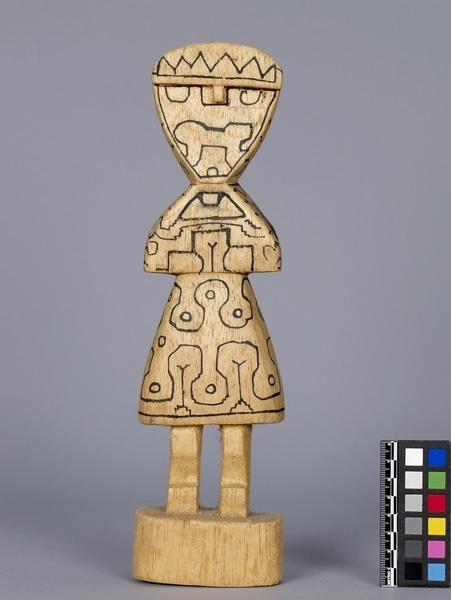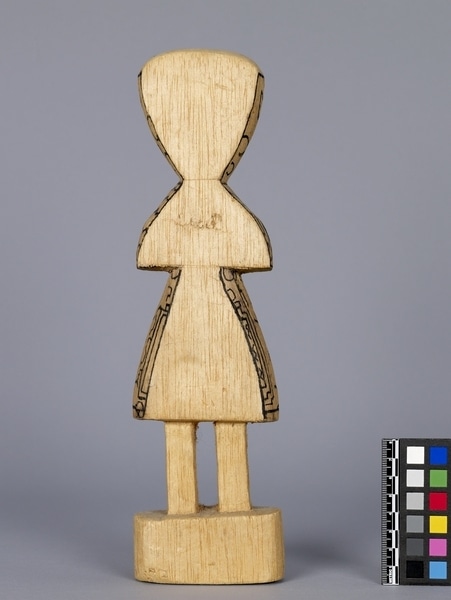Doll Item Number: 2738/95 from the MOA: University of British Columbia



Description
Carved light coloured balsa wood female doll on an oval stand. The basic-outline-shaped figure with carved nose has black facial tattoo and black designs covering the front and sides of the hat, jacket and skirt; the legs, stand and back of the body are plain.
History Of Use
In Shipibo worldview all things bear specific designs. In the clear-cut gender division of their groups, the knowledge of rendering those designs (kené) visible to all is a women’s knowledge, laborious learned from their mothers, their elders and peers for all their lives. These dolls are part of such learning process. At one level, the dolls help children to socialize along gender divisions, in that girls play with these dolls and experiment and debate these designs. At another level, by making explicit that human bodies have designs, they juxtapose to beauty the notion of health, in the sense that healthy bodies have perfectly organized designs. In a practical, everyday sense, Shipibo do not paint the whole body. Usually they only paint their face and the arms and legs. However, if one is ill, a healing session is nothing else than the redrawing of one’s personal designs, conducted by the shaman under the guidance of the powers of the forest’s plants.
Specific Techniques
Shipibo women use strips of bamboo for a brush and personal mixes of vegetable and earth pigments as dyes, washes and fixatives.
Iconographic Meaning
Design (kené) makes explicit that human bodies have designs, and juxtapose to beauty the notion of health, in the sense that healthy bodies have perfectly organized designs. It is considered that beauty and health are one and the same thing. Both are likely to be obtained and maintained by the morals of a good life: a life based in communication, in sharing, and in opening oneself to others; a life anchored in a general attitude of generosity and, as well, of self-control and self-reliance, where the realization of one person and her fulfillment is also the fulfillment of each and everyone in the community.
Item History
- Made in Loreto, Peru
- Owned by Blanca Muratorio and Ricardo Muratorio before May 1, 2009
- Received from Blanca Muratorio (Donor) and Ricardo Muratorio (Donor) on May 1, 2009
What
- Name
- Doll
- Identification Number
- 2738/95
- Type of Item
- doll
- Material
- balsa wood and paint
- Overall
- height 30.0 cm, width 8.5 cm, depth 5.0 cm
Who
- Culture
- Shipibo
- Previous Owner
- Blanca Muratorio and Ricardo Muratorio
- Received from
- Blanca Muratorio (Donor) and Ricardo Muratorio (Donor)
Where
- Holding Institution
- MOA: University of British Columbia
- Made in
- Loreto, Peru
When
- Ownership Date
- before May 1, 2009
- Acquisition Date
- on May 1, 2009
Other
- Condition
- good
- Current Location
- Case 94
- Accession Number
- 2738/0095